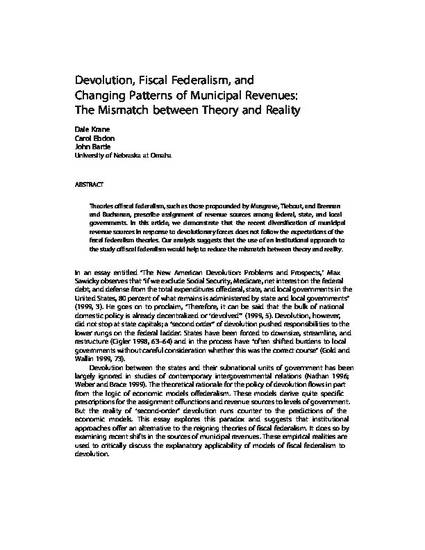
Article
Devolution, Fiscal Federalism, and Changing Patterns of Municipal Revenues: The Mismatch between Theory and Reality
Journal of Public Administration Research and Theory
Document Type
Article
Publication Date
10-1-2004
Abstract
Theories of fiscal federalism, such as those propounded by Musgrave, Tiebout, and Brennan and Buchanan, prescribe assignment of revenue sources among federal, state, and local governments. In this article, we demonstrate that the recent diversification of municipal revenue sources in response to devolutionary forces does not follow the expectations of the fiscal federalism theories. Our analysis suggests that the use of an institutional approach to the study of fiscal federalism would help to reduce the mismatch between theory and reality.
Citation Information
Dale Krane, Carol Ebdon and John R. Bartle. "Devolution, Fiscal Federalism, and Changing Patterns of Municipal Revenues: The Mismatch between Theory and Reality" Journal of Public Administration Research and Theory Vol. 14 Iss. 4 (2004) p. 513 - 533 Available at: http://works.bepress.com/dale_krane/1/

This is a pre-copyedited, author-produced PDF of an article accepted for publication in Journal of Public Administration Research and Theory following peer review. The definitive publisher-authenticated version Krane, D., Ebdon, C., & Bartle, J. (2004). Devolution, fiscal federalism, and changing patterns of municipal revenues: The mismatch between theory and reality. Journal of Public Administration Research and Theory, 14(4), 513-533 is available online at: http://jpart.oxfordjournals.org/content/14/4/513.abstract.